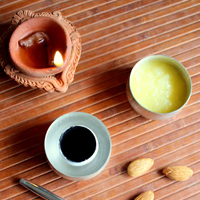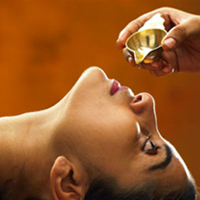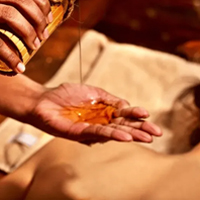Ayurvedic Dincharya (Daily Routine) as per ancient Texts:
In Ayurveda, the concept of Dincharya refers to the daily regimen that aligns one’s activities with the natural cycles of day and night. This ancient practice is designed to promote health, prevent disease and maintain balance among the three doshas (body constitutions) – Vata, Pitta and Kapha. Each activity in the Dincharya has specific benefits that help to balance these doshas. The key ancient texts such as Charaka Samhita and Sushruta Samhita provide detailed guidelines for an ideal daily routine. Here are the main components:
1. Brahmamuhurtajagaranam (Waking up in the Brahma-muhurta time):

Time: Approximately 96 minutes before sunrise.
Importance: This time is considered sattvic (pure) and conducive to maintain meditation, introspection and planning for the day. It is considered to be the time of the God where the cosmic energy is at its peak and one can feel a lot of calmness and peace within himself/herself. Waking up early helps balance all these three doshas particularly Kapha by avoiding the sluggishness that can come from oversleeping.
2. Malotsarjanam – Evacuation:
Practice: Emptying bowels and bladder first thing in the morning.
Importance: This helps in eliminating the waste products from the body and prevents the buildup of toxins. This practice mainly balances Vata by promoting regularity and preventing constipation.
3. Dantadhavanam – Brushing Teeth:

Practice: Using herbal sticks or powders made from neem, licorice or other beneficial herbs.
Importance: Maintaining oral hygiene to prevent dental issues and enhance digestion. Furthermore, its benefits are not only limited to the oral hygiene rather it helps to balance the three doshas – vata, pitta and kafa, as per ayurveda imbalance of these three doshas is the root cause of suffering.
4. Jihva Nirlekhanam – Tongue Scraping:

Practice: Scraping the tongue with a metal scarper.
Importance: Removes accumulated toxins (ama), enhances taste and promotes the oral health. This practice primarily balances Pitta by eliminating excess heat and toxins from the digestive tract.
5. Anjalanjanam – Eye Care:

Practice: Applying collyrium (kajal or anjana) to the eyes.
Importance: Improves vision and prevents eye diseases. This activity helps balance Pitta, which governs vision and can become aggravated by heat and stain.
Note: In our ashram we have a natural and self-made kajal or anjana by the guru of the ashram.
6. Nasyakarma – Nasal Therapy:

Practice: Administrating medicated oil into the nostrils.
Importance: Clears the sinuses, improves breathing and enhances mental clarity. Nasya primarily balances Kapha by clearing mucus and congestion from the nasal passages.
Note: The oil is made with the standard ayurvedic ways with the mixing of different herbs and applying ayurvedic procedure by the Guru of Ashram for optimum results.
7. Gandusadharanam – Oil Pulling:

Practice: Swishing oil in the mouth.
Importance: Strengthening teeth and gums, removes toxins and improves oral health. This practice supports Kapha balance by maintaining oral hygiene and removing accumulated toxins.
8. Abhyangam – Oil Massage:

Practice: Self-massage with warm herbal oils.
Importance: Nourishes the skin, improves circulation and calms the nervous system. Abhyangam helps balance Vata by calming the nervous system and providing moisture and warmth to the body.
9. Vyayamah – Exercise:

Practice: This includes the physical activities such as yoga, walking or any form of exercise but at this program in our ashram we offer yoga sessions by our experienced yoga teacher.
Importance: Promotes strength, flexibility and vitality. Vyayamah balances Kapha by preventing lethargy and Vata by maintaining mobility and circulation.
10. Snanam – Bathing:
Practice: The Guru will suggest the bath for the person as per his/her body nature. The temperature of the water whether cold or lukewarm water will be directed by the Guru of the Ashram.
Importance: Cleanses the body, refreshes the mind and prepares for the day ahead. Bathing balances Pitta by cooling and calming the body and Vata by providing warmth.
11. Vastradharanam – Dressing:
Practice: Wearing clean and appropriate clothing.
Importance: Ensures personal hygiene and comfort. Wearing suitable clothing helps maintain balance in all doshas by providing physical and mental comfort.
12. Prasadam –Meals:
Practice: Eating meals at regular intervals with lunch being the main meal.
Importance: Balances digestion and maintains energy levels. Meals are wholesome, freshly prepared and suitable to one’s dosh (body constitution). Proper eating habits balance Pitta by regulating digestive fire (Agni), Vata by providing grounding nourishment and Kapha by avoiding overeating and heavy foods.
In Ashram we provide satvic food and we are very conscious on each ingredients used in the food. For example, we don’t use processed oil from the market which is bad for our health rather we use mustard oil prepared in the village by their local methods. We don’t use salt and white sugar, we have a better alternatives which are very beneficiary for the health. Likewise we serve brown rice instead of white rice and same applies for other ingredients including lentils and veggies. Most of the veggies are grown up in the Ashram area.
13. Karyanusthanam – Daily Activities:
Practice: Engaging in professional and personal responsibilities.
Importance: Fulfils duties and responsibilities in a balanced manner. This practice keeps all doshas in check by promoting a balanced lifestyle and avoiding stress.
14. Sayam Sandhya – Evening Routine:
Practice: Winding down with calming activities such as light reading of spiritual books. The reading while sleeping and waking up imprints in our subconscious mind so it’s ideal to read spiritual books while sleeping while helps to progress in the spiritual path.
Importance: Prepares the body and mind for rest, ensuring a peaceful night’s sleep. Evening routines help balance Vata by promoting relaxation and grounding and Pitta by cooling the body and mind.
15. Ratricharya – Nighttime Routine:
Practice: Going to bed early, ideally by 9 PM.
Importance: Ensures adequate rest and rejuvenation, aligning with the body’s natural circadian rhythms. Proper sleep balances all three doshas particularly Vata by calming the nervous system and Pitta by cooling and rejuvenating the body.
The night time is considered to be the time of devils in Hindu mythology and it is not considered better to awake in this time. In modern medical science too the period from 11 PM to 2 PM is considered the time for release of melatonin for which it is necessary to sleep at least 2 hour earlier that is before 9 PM. Melatonin has various role in our body including maintaining sleep-wake cycle, circadian rhythms, antioxidant properties, immune system support, mood regulation, reproductive function, anti-aging and many more. The most important function is that it is responsible for happiness.
16. Dhyanam – Meditation:
Practice: Incorporating meditation or mindfulness practices at some point in the day.
Importance: Reduces stress, enhances mental clarity and promotes overall well-being. Meditation primarily balances Vata by calming the mind, Pitta by reducing stress and intensity and Kapha by preventing lethargy and promoting alertness.
By following these Ayurvedic Dicharcharya guidelines, our retreat aims to help you achieve harmony with nature, fostering a balanced lifestyle and preventive approach to health. Join us to experience this ancient wisdom in a serene and supportive environment, tailored to balance your unique dosha composition for optimal well-being.
Benefits of ayurvedic dincharya
Ayurvedic dincharya, or daily routine, encompasses a set of practices designed to promote physical, mental, and spiritual well-being. Here are some benefits associated with following Ayurvedic dincharya:
- 1. Promotes Balance: Ayurveda emphasizes aligning daily activities with natural rhythms (circadian rhythms). This helps balance the body’s doshas (Vata, Pitta, Kapha), promoting overall health and vitality.
- 2. Enhances Digestion: Regular eating and sleeping times, as advocated in dincharya, support optimal digestion. This includes eating meals at consistent times and allowing adequate time for digestion before sleeping.
- 3. Improves Quality of Sleep: Establishing a bedtime routine and following practices like oil massage (Abhyanga) can improve sleep quality. This helps regulate sleep patterns and enhances restfulness.
- 4. Boosts Energy Levels: Following dincharya includes practices like morning exercise (e.g., yoga or stretching), which invigorate the body and mind, promoting sustained energy throughout the day.
- 5. Supports Mental Clarity: Activities such as meditation or pranayama (breathing exercises) included in dincharya help calm the mind, improve focus, and reduce stress, promoting mental clarity and emotional balance.
- 6. Strengthens Immunity: Ayurvedic practices often include herbal supplements or dietary recommendations that support immune function, contributing to overall resilience against illnesses.
- 7. Enhances Skin and Hair Health: Practices like oil massage (Abhyanga) and following a balanced diet tailored to your dosha type can improve skin texture, prevent dryness, and promote healthy hair growth.
- 8. Reduces Stress: Dincharya encourages regular self-care practices, such as meditation, yoga, or simple relaxation techniques, which help reduce stress levels and promote a sense of well-being.
- 9. Improves Longevity: By promoting overall health and balance, Ayurvedic dincharya aims to enhance longevity by preventing diseases and promoting healthy aging.
- 10. Personalized Approach: Ayurvedic dincharya can be customized based on individual constitution (prakriti) and seasonal variations (ritucharya), making it a holistic and adaptable approach to maintaining health.
Overall, Ayurvedic dincharya offers a comprehensive framework for maintaining health and well-being by aligning daily routines with natural rhythms and individual needs.
What people are saying
“I was looking for a Social Media Course to expand my career horizon. A friend of mine suggested to learn from Steve’s online courses and it really worked for me.”
Flora BakerNew York
“A fantastic and very engaging course. All of the information offered by Steve was completely practical, relevant and presented in an easy, digestible and interesting way.”

Glen StephensLondon
“This course was a breakthrough in my knowledge of digital marketing. The content is comprehensive and of great quality, engaging and interactive.”

Terry HigginsBerlin
Previous
Next



